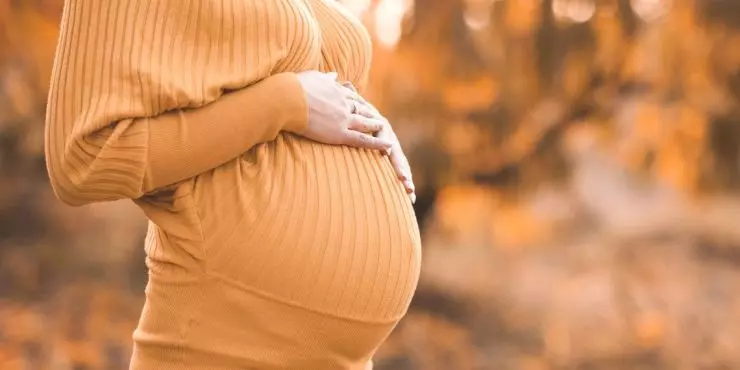
Pregnancy is such an exciting journey, filled with so many new experiences and, let's be honest, a lot of questions! As your OB provider, one of the most common questions we hear, especially as fall and winter approach, is: "Are the flu, RSV, and COVID vaccines safe during pregnancy?"
The short answer, and the most important one, is a resounding yes! These vaccines are strongly recommended by leading medical groups, and they offer incredible protection for both you and your precious baby. Below, you'll find a clear and practical guide to help you feel confident in making the best decisions for your health and your little one's, complete with helpful timing tips and what you can expect.
Why Vaccinating During Pregnancy is So Important

Your body is doing incredible work growing a baby, and with that comes some natural changes to your immune system. This means you're a bit more susceptible to severe illness from respiratory viruses. Vaccinating during pregnancy offers two key benefits:
-
Protecting You: It significantly lowers your risk of becoming seriously ill from these viruses, which is always best for a healthy pregnancy. Pregnancy also makes you a little more susceptible to illness.
-
Protecting Your Baby: Your amazing body passes protective antibodies to your baby through the placenta. This gives your newborn crucial early protection in those first vulnerable months of life, before they're old enough to be vaccinated themselves.
Let's break down each vaccine:
The Flu Vaccine (Influenza)
Think of the flu vaccine as your annual shield against influenza.
- Safety You Can Trust: Inactivated flu shots have been safely given to millions of pregnant individuals for decades. They have an excellent safety record and can be given at any point during your pregnancy.
- Timing is Key: Ideally, you'll want to get your flu shot in September or October, or as soon as it becomes available during flu season. If you happen to be in your third trimester earlier in the summer and your clinic offers it, getting vaccinated then can also be a good option.
- Big Benefits: This vaccine dramatically lowers your risk of hospitalization and other pregnancy complications linked to the flu. Plus, those maternal antibodies you pass on help protect your baby right after birth.
The COVID-19 Vaccine
Staying up-to-date with your COVID-19 vaccine is a vital step in protecting your health and your baby's.
- Strong Recommendations: Both the CDC and ACOG recommend the COVID-19 vaccine for anyone who is pregnant, trying to conceive, or breastfeeding.
- Proven Safety: Extensive studies have shown no increased risk of birth defects or adverse pregnancy outcomes. The protection it offers against severe disease is truly significant.
- Flexible Timing: You can get the most current (2024–2025) vaccine at any time during your pregnancy. The goal is simply to be "up-to-date," so there's no need to delay based on which trimester you're in.
The Maternal RSV Vaccine (Third Trimester Only)
RSV (Respiratory Syncytial Virus) can be very serious for infants, and this vaccine offers a powerful way to protect your little one.
- Specific Timing for Maximum Impact: A single dose of Pfizer Abrysvo is recommended between 32 weeks 0 days and 36 weeks 6 days of pregnancy, specifically during RSV season. This timing is crucial because it allows your body to build and pass on those protective antibodies to your baby before birth.
- If You Miss the Window: If you happen to be beyond 36 weeks and 6 days at the time of vaccination, don't worry! Your newborn can instead receive an RSV antibody called nirsevimab shortly after birth.
- Why It Matters So Much: RSV is a leading cause of infant hospitalization. By getting the maternal vaccine (or ensuring your infant receives the antibodies), you meaningfully lower that risk, giving your baby a healthier start.
How These Vaccines Work Together (and What to Do if Delivery is Near)
- Can I get more than one vaccine at the same visit? Yes, absolutely! It's perfectly safe to get more than one vaccine during the same appointment (for example, your flu shot and COVID vaccine, or flu and RSV when appropriate). Your provider can help you plan the best sequence based on your due date and the current season.
- Due in the next few weeks? If you're past 36 weeks and 6 days, we'll skip the maternal RSV shot. Instead, we'll plan for your newborn to receive nirsevimab after birth (or at the start of RSV season) to ensure they still get that vital protection.
- Already had flu/COVID/RSV this season? You may still benefit from vaccination, as immunity from natural infection can vary. It's always a good idea to discuss the best timing with your clinician.
What Side Effects Should I Expect?
It's normal to have a few mild side effects, which are actually signs that your immune system is building protection!
- Common: You might experience a sore arm, fatigue, a mild fever, or body aches for 1–2 days.
- When to Call Us: Please don't hesitate to call if you have a high fever that doesn't respond to acetaminophen, any symptoms that worry you, or anything that just feels "not right" during your pregnancy.
Breastfeeding and Postpartum
- Continued Protection: Flu and COVID vaccines are safe while breastfeeding and can continue to provide antibodies to your baby through breast milk.
- RSV Protection After Birth: If you didn't receive the maternal RSV shot during pregnancy, your infant can still receive nirsevimab after birth during RSV season.
Minnesota-Specific Access Tips
- Easy Access: Flu and COVID vaccines are widely available at clinics and pharmacies throughout Minnesota.
- Maternal RSV: The maternal RSV vaccination is typically offered in OB settings. Our Northwest Family Clinics locations in Crystal, Rogers, and Plymouth typically have this vaccine stocked but you’re welcome to call and confirm availability and let us help you determine the best timing for your due date.
- If Supply is Limited: Should vaccine supply be limited in your area, we'll work with you to coordinate alternatives, such as infant nirsevimab after delivery, to ensure your baby is protected.
Straight Answers to Common Pregnancy Questions

Is it safe in the first trimester? Yes, both the flu and COVID vaccines are safe in any trimester. The maternal RSV vaccine is specifically for the third trimester (32–36 weeks and 6 days).
Could vaccines harm my baby? The evidence is very clear: recommended vaccines do not show an increased risk of miscarriage or birth defects. In fact, vaccination reduces your risk of severe illness, which is always better for both you and your baby.
What if I had COVID recently? You can still get vaccinated! Talk with your provider about the best interval since your infection to maximize your protection.
Can I get Tdap too? Yes! The Tdap vaccine is also recommended during each pregnancy (between 27–36 weeks) to protect against whooping cough. Your clinician can easily plan this alongside your other vaccines.
What if guidance I see online looks conflicting? Recommendations can sometimes change seasonally. We always follow the most current CDC/ACOG guidance and will tailor the timing to your individual medical history and due date.
The Bottom Line

For most pregnancies, the flu and COVID vaccines can be given in any trimester. The maternal RSV vaccine is specifically recommended between 32–36 weeks and 6 days during RSV season. If you're past that window, we'll make sure your infant receives protective antibodies after birth. Our dedicated team is here to help you choose the best timing so both you and your baby are well-protected as you head into that precious newborn period.